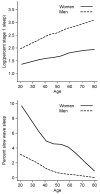Women sleep objectively better than men and the sleep of young women is more resilient to external stressors: effects of age and menopause
- PMID: 19302341
- PMCID: PMC3594776
- DOI: 10.1111/j.1365-2869.2008.00713.x
Women sleep objectively better than men and the sleep of young women is more resilient to external stressors: effects of age and menopause
Abstract
The aims of this study were to: (i) assess gender differences of objective sleep patterns in a general population sample; (ii) evaluate the effects of menopause and hormone treatment (HT) on the sleep of the same cohort; and (iii) examine gender differences in sleep resilience towards external stressors. The participants were (i) 1324 subjects without sleep complaints, recruited from the general population of Central Pennsylvania that spent one night in the sleep laboratory and (ii) 66 young, healthy volunteers whose sleep was disturbed during night four by an external stressor, i.e. 24-h blood drawing (average of nights 2 and 3 versus night 4). Women compared with men in the general population sample had significantly higher percentage of sleep time, lower percentage of stage 1, and higher percentage of slow wave sleep. Also, menopause, in the absence of HT, was associated with prolonged sleep latency and decreased deep sleep. Finally, young, healthy women compared with men experienced less sleep disturbance because of blood draws as indicated by a significantly smaller change in per cent sleep time, and percentage of stage 1 sleep. These findings suggest that women without sleep complaints sleep objectively better across age than men and the sleep of young women is more resistant to external stressors. Also, gonadal hormones exert a beneficial effect on women's sleep. This gender dimorphism in sleep regulation may have been to protect women from the demands of infant and child care, and in part, might contribute to women's lower cardiovascular risks and greater longevity.
Figures


Similar articles
-
Midlife women's responses to a hospital sleep challenge: aging and menopause effects on sleep architecture.J Womens Health (Larchmt). 2004 Apr;13(3):333-40. doi: 10.1089/154099904323016491. J Womens Health (Larchmt). 2004. PMID: 15130262
-
Estrogen replacement therapy moderates the sleep disruption associated with nocturnal blood sampling.Sleep. 2001 Dec 15;24(8):886-94. doi: 10.1093/sleep/24.8.886. Sleep. 2001. PMID: 11766158
-
Effects of aging on sleep structure throughout adulthood: a population-based study.Sleep Med. 2014 Apr;15(4):401-9. doi: 10.1016/j.sleep.2013.11.791. Epub 2014 Feb 26. Sleep Med. 2014. PMID: 24657204
-
Sleep and menopause.Nurs Clin North Am. 2004 Mar;39(1):97-115. doi: 10.1016/j.cnur.2003.11.006. Nurs Clin North Am. 2004. PMID: 15062730 Review.
-
Prognostic features of menopausal and postmenopausal applicants for life insurance.J Insur Med. 1996;28(1):27-34. J Insur Med. 1996. PMID: 10172866 Review.
Cited by
-
Mild obstructive sleep apnoea in females: post hoc analysis of the MERGE randomised controlled trial.ERJ Open Res. 2024 Feb 5;10(1):00574-2023. doi: 10.1183/23120541.00574-2023. eCollection 2024 Jan. ERJ Open Res. 2024. PMID: 38333643 Free PMC article.
-
Differences in sleep disturbance and fatigue between patients with breast and prostate cancer at the initiation of radiation therapy.J Pain Symptom Manage. 2011 Aug;42(2):239-50. doi: 10.1016/j.jpainsymman.2010.11.010. Epub 2011 Mar 31. J Pain Symptom Manage. 2011. PMID: 21454042 Free PMC article.
-
Prevalent and sex-biased breathing patterns modify functional connectivity MRI in young adults.Nat Commun. 2020 Oct 20;11(1):5290. doi: 10.1038/s41467-020-18974-9. Nat Commun. 2020. PMID: 33082311 Free PMC article.
-
Gender differences in the relationship between sleep and age in a Brazilian cohort: the Baependi Heart Study.J Sleep Res. 2025 Aug;34(4):e14154. doi: 10.1111/jsr.14154. Epub 2024 Jan 29. J Sleep Res. 2025. PMID: 38286415 Free PMC article.
-
Sleep quality, duration, and consistency are associated with better academic performance in college students.NPJ Sci Learn. 2019 Oct 1;4:16. doi: 10.1038/s41539-019-0055-z. eCollection 2019. NPJ Sci Learn. 2019. PMID: 31583118 Free PMC article.
References
-
- Adam K. Sleep is changed by blood sampling through an indwelling venous catheter. Sleep. 1982;5:154–158. - PubMed
-
- Benca RM, Obermeyer WH, Thisted RA, Gillin JC. Sleep and psychiatric disorders: a meta-analysis. Arch. Gen. Psychiatry. 1992;49:651–668. - PubMed
-
- Bixler E, Vgontzas A, Lin HM, Ten Have T, Rein J, Vela-Bueno A, Kales A. Prevalence of sleep disordered breathing in women: effects of gender. Am. J. Respir. Crit. Care Med. 2001;163:608–613. - PubMed
-
- Bixler EO, Vgontzas AN, Lin HM, Vela-Bueno A, Kales A. Insomnia in central Pennsylvania. J. Psychosom. Res. 2002;53:89–592. - PubMed
-
- Bixler EO, Vgontzas AN, Lin HM, Vela-Bueno A, Kales A. Women and sleep-related disorders. Eur. Respir. Med. 2003;25:24–218.
Publication types
MeSH terms
Grants and funding
LinkOut - more resources
Full Text Sources
Medical

